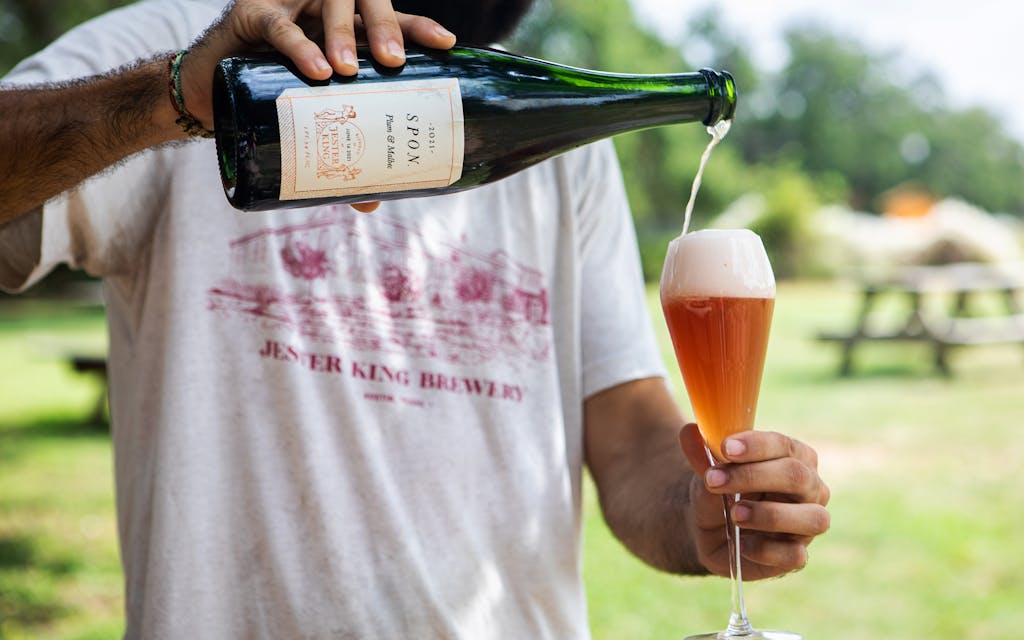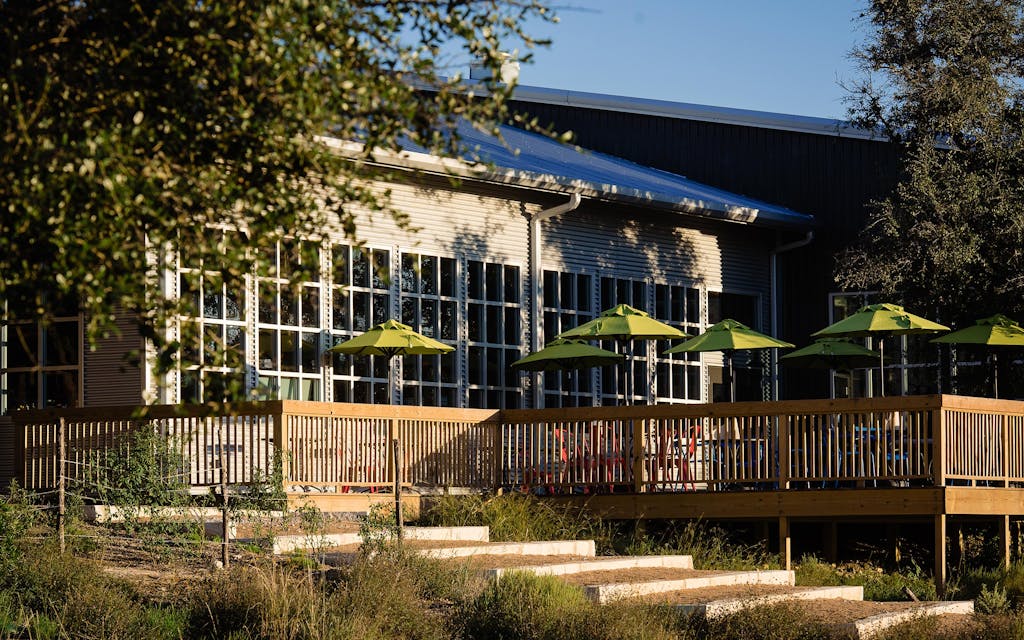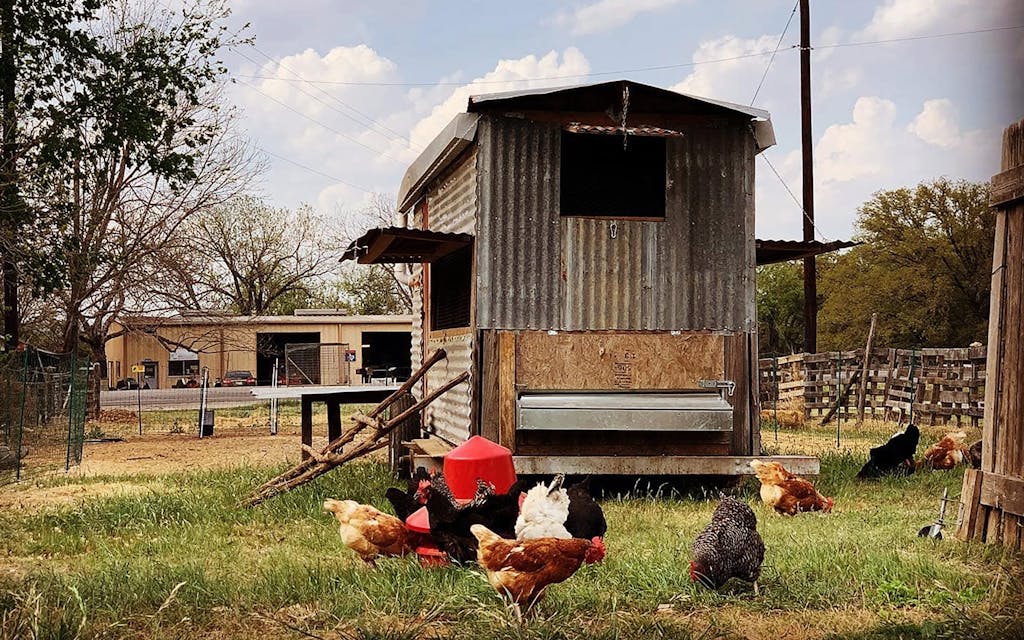Farm-to-table dining, a fifty-year movement to eat locally and sustainably, may have reached its apex about a decade ago. More recently, breweries are joining in with farm-to-glass drinking, which means that everything—from hops to yeast—is locally sourced and produced to capture the essence of the land in a pint. (Of course, this is nothing new to wineries that have boasted of expressing terroir for many years.)
Central Texas is proving to be the, well, center of farm-to-table beer in the state. The wide array of flora and fauna, the quality of the well and spring water, the warm climate, and the wide-open spaces all make the Hill Country exceptionally suited to the task. It’s cemented by the innately Texan desire to support local.
The farm-to-glass philosophy and business practice requires dedication from the owners and staffs of these Hill Country breweries, who often go the extra mile to make sure their operations lower waste, take care of the land, make relationships with Texas growers and ranchers, and think outside the box.
The six Central Texas breweries below are great examples of this business model. Plus, they all have fabulous patios that allow visitors to relax and connect more with the natural environment that influences the products.

Jester King Brewery
Jester King is an internationally renowned trailblazer whose environmentally conscious practices have been inspiring breweries since 2010. In recent years, the brewery has expanded to include its own farm, from which it harvests fruit and vegetables for its beer and food. It cultivates its own in-house yeast strains by swabbing samples from plants and wildflowers around the brewery. Jester King also brews with Texas-grown grain and local well water. The All-Texas SPON, released in 2021, is potentially the first modern beer to be brewed with entirely Texan ingredients. Cofounder Jeffrey Stuffings places an emphasis on the exclusive opportunities offered by Jester King’s methods. “We get excited when we get to taste something that could only exist because of its region, season, chef, or brewer,” he says. “It’s like seeing the culinary world in color.”
Vista Brewing
Driftwood’s Vista Brewing may only be four years old, but it has established itself as a must-visit destination with exceptional food and beer. Vista boasts its own farm and apiary, and its focus on sustainable cycles includes partnering with neighboring Double J Ranch, where the brewery’s spent grain becomes feed for the Aberdeen Angus cattle, which are then used for Vista’s burgers. “We strive to source as much from here in Texas as possible, from our brewing ingredients to the bottle labels, from breads to cheeses to proteins and mushrooms,” cofounder Karen Killough says. “We want to support our local economy and other family-owned businesses, as well as reduce the miles our ingredients travel.” All Vista’s brewing and drinking water comes from the on-site well, and it sources grains from nearby Barton Springs Mill and malt from TexMalt in Fort Worth. Vista also uses barrels from local wineries and distilleries for its beers, and honey from its apiary features in select beers and food items.
Roughhouse Brewing
In San Marcos, Roughhouse Brewing combines the output of its garden with other local ingredients to create a full farm-to-table brewpub experience. “Being native Texans, we have a natural love for the diverse and expansive ecology of Texas,” cofounder Alex Pasternak says. “There is so much to learn about this land, and our brewery is an extension of that interest and how we can play with Texas agriculture to make a high-quality beer.” Roughhouse brews with approximately 85 percent Texas grains from TexMalt and Barton Springs Mill, on-site well water, and local fruits and herbs. “We are particularly proud of a blonde ale we release in springtime, Floral Print,” Pasternak says. “We steep the beer with dehydrated calendula flowers that we grow in our on-site garden.” Roughhouse also partners with Three Six General butcher and smokehouse to ensure that the meats in menu items such as the chili, the chopped beef sandwich, and the pulled pork tacos come from local farmers. For its spontaneously fermented, cave-aged Underground collection, the brewery harvests yeast from its property, much like Jester King.

Beerburg Brewing
Located across the road from Jester King near Dripping Springs, Beerberg Brewing is pushing boundaries with its foraged beers while also taking major steps to become landfill-free. For founder Trevor Nearburg, running a farm-to-table business is a moral decision with a strong environmental impetus. “As a native Texan and herbalist, I grew up surrounded by these wild ingredients—things like yarrow, mugwort, and juniper—without ever realizing their role in our lives,” he says, referencing the herbs foraged on-site for the brewery’s Wildcraft series. As well as brewing with on-site well water, Beerburg brews with malts from TexMalt and Maverick Malt House (located near Amarillo) and yeast from Community Cultures Yeast Lab in San Antonio. It also partners with 44 Farms in Cameron and Capra Foods Lamb Cooperative in Goldthwaite for beef and lamb used in birria tacos. Minimizing waste is also crucial at Beerburg. “All the packaging, fuel, water, and energy that goes into transportation and the greenhouse gases it produces is super easy to avoid if you source locally,” Nearburg says. Beerburg recycles all its food scraps and cooking oil through Austin-based GrubTubs, which coverts them into animal feed and biofuel, respectively.
Cibolo Creek Brewing Co.
In Boerne, Cibolo Creek Brewing Co. boasts a menu that includes Texas-raised goat, beef, and chicken eggs. Those meats and produce come from the brewery’s sister business, Windy Hill Foods, a local distribution company for Hill Country farmers and ranchers employing organic and hormone- and antibiotic-free practices. Head brewer Ty Wolosin believes the key advantage is superior food. “The ranchers we work with care for their animals, and the results is a tastier end product,” he says. Cibolo Creek also uses malt from Maverick Malt House and local honey and fruits in its beers when available. Wolosin places significant value on the importance of community. “Tell folks where you are getting your product from,” he says. “Tell them you are supporting local ranchers, who in turn spend that money locally. The closer knit the economic web, the better for all of us small businesses.”

Farm Ale Brewing Co.
Farm Ale’s original location is out in Eola, just east of San Angelo, but it has a distribution site in Hye in the Hill Country, where you can enjoy its 100 percent source-verified beer. That means “you know exactly from where it comes, how it’s grown, and the significant qualities that make it unique and authentic to your business,” says Callisto Griffith, director of marketing at Farm Ale. The menu features ingredients sourced from Texas suppliers, including Hye There Farm, Marfa Meats, and Fuchs Family Farm; items from its own garden, where it currently grows cherry tomatoes, green beans, red and yellow onions, bell peppers, jalapeños, and cilantro; and fresh eggs collected from on-site chickens. To promote sustainability even further, the brewery donates 1.5 percent of all its proceeds back to the local farmers it sources from.

